×
Il semble que vous utilisiez une version obsolète de internet explorer. Internet explorer n'est plus supporté par Microsoft depuis fin 2015. Nous vous invitons à utiliser un navigateur plus récent tel que Firefox, Google Chrome ou Microsoft Edge.
This webinar is operated by Incathlab and is subject to the Incathlab privacy policy and terms of use. Cardinal Health will receive only aggregate trend reports (no personal data).
Program
|
18:00 - 18:45
|
Session 1
|
|
|
| 18:45 - 19:30 | Session 2 |
|
For Healthcare Professionals Only. CORDIS Effect LOGO is a trademarks of Cardinal Health and may be registered in the US and/or in other countries.
© 2020 Cardinal Health. All Rights Reserved. EU 100561599 06/2020
Date du tournage : 24/06/2020
Dernière mise à jour : 25/06/2020
Dernière mise à jour : 25/06/2020
Participer à la discussion
Suggestions
Mercredi 23 octobre 2019 de 12h à 13h30 (GMT+2)
Honolulu : Mercredi 23 octobre 2019 de 01h à 02h30 (GMT+2)
San Francisco : Mercredi 23 octobre 2019 de 04h à 05h30 (GMT+2)
New York : Mercredi 23 octobre 2019 de 07h à 08h30 (GMT+2)
Buenos Aires : Mercredi 23 octobre 2019 de 08h à 09h30 (GMT+2)
Reykjavik : Mercredi 23 octobre 2019 de 11h à 12h30 (GMT+2)
London / Dublin : Mercredi 23 octobre 2019 de 12h à 13h30 (GMT+2)
Paris / Berlin : Mercredi 23 octobre 2019 de 13h à 14h30 (GMT+2)
Istanbul : Mercredi 23 octobre 2019 de 14h à 15h30 (GMT+2)
Moscou / Dubaï : Mercredi 23 octobre 2019 de 15h à 16h30 (GMT+2)
Bangkok : Mercredi 23 octobre 2019 de 18h à 19h30 (GMT+2)
Shanghai : Mercredi 23 octobre 2019 de 19h à 20h30 (GMT+2)
Tokyo : Mercredi 23 octobre 2019 de 20h à 21h30 (GMT+2)
Sydney : Mercredi 23 octobre 2019 de 22h à 23h30 (GMT+2)
Wellington : Jeudi 24 octobre 2019 de 00h à 01h30 (GMT+2)
San Francisco : Mercredi 23 octobre 2019 de 04h à 05h30 (GMT+2)
New York : Mercredi 23 octobre 2019 de 07h à 08h30 (GMT+2)
Buenos Aires : Mercredi 23 octobre 2019 de 08h à 09h30 (GMT+2)
Reykjavik : Mercredi 23 octobre 2019 de 11h à 12h30 (GMT+2)
London / Dublin : Mercredi 23 octobre 2019 de 12h à 13h30 (GMT+2)
Paris / Berlin : Mercredi 23 octobre 2019 de 13h à 14h30 (GMT+2)
Istanbul : Mercredi 23 octobre 2019 de 14h à 15h30 (GMT+2)
Moscou / Dubaï : Mercredi 23 octobre 2019 de 15h à 16h30 (GMT+2)
Bangkok : Mercredi 23 octobre 2019 de 18h à 19h30 (GMT+2)
Shanghai : Mercredi 23 octobre 2019 de 19h à 20h30 (GMT+2)
Tokyo : Mercredi 23 octobre 2019 de 20h à 21h30 (GMT+2)
Sydney : Mercredi 23 octobre 2019 de 22h à 23h30 (GMT+2)
Wellington : Jeudi 24 octobre 2019 de 00h à 01h30 (GMT+2)
Clinical decision making in patients with high risk of restenosis in Fem- pop: when and how to prepa...
SOLVING UNMET NEEDS in Peripheral Vascular: episode 1
Partager
August 2013
Honolulu : Mardi 27 août 2013 de 05h à 07h (GMT+2)
San Francisco : Mardi 27 août 2013 de 08h à 10h (GMT+2)
New York : Mardi 27 août 2013 de 11h à 13h (GMT+2)
Buenos Aires : Mardi 27 août 2013 de 12h à 14h (GMT+2)
Reykjavik : Mardi 27 août 2013 de 15h à 17h (GMT+2)
London / Dublin : Mardi 27 août 2013 de 16h à 18h (GMT+2)
Paris / Berlin : Mardi 27 août 2013 de 17h à 19h (GMT+2)
Istanbul : Mardi 27 août 2013 de 18h à 20h (GMT+2)
Moscou / Dubaï : Mardi 27 août 2013 de 19h à 21h (GMT+2)
Bangkok : Mardi 27 août 2013 de 22h à 00h (GMT+2)
Shanghai : Mardi 27 août 2013 de 23h à 01h (GMT+2)
Tokyo : Mercredi 28 août 2013 de 00h à 02h (GMT+2)
Sydney : Mercredi 28 août 2013 de 02h à 04h (GMT+2)
Wellington : Mercredi 28 août 2013 de 04h à 06h (GMT+2)
San Francisco : Mardi 27 août 2013 de 08h à 10h (GMT+2)
New York : Mardi 27 août 2013 de 11h à 13h (GMT+2)
Buenos Aires : Mardi 27 août 2013 de 12h à 14h (GMT+2)
Reykjavik : Mardi 27 août 2013 de 15h à 17h (GMT+2)
London / Dublin : Mardi 27 août 2013 de 16h à 18h (GMT+2)
Paris / Berlin : Mardi 27 août 2013 de 17h à 19h (GMT+2)
Istanbul : Mardi 27 août 2013 de 18h à 20h (GMT+2)
Moscou / Dubaï : Mardi 27 août 2013 de 19h à 21h (GMT+2)
Bangkok : Mardi 27 août 2013 de 22h à 00h (GMT+2)
Shanghai : Mardi 27 août 2013 de 23h à 01h (GMT+2)
Tokyo : Mercredi 28 août 2013 de 00h à 02h (GMT+2)
Sydney : Mercredi 28 août 2013 de 02h à 04h (GMT+2)
Wellington : Mercredi 28 août 2013 de 04h à 06h (GMT+2)
Leipzig in Avignon: Update in femoro-popliteal recanalization
Live from Clinique Rhône-Durance, Avignon, France
Partager
October 2013
Honolulu : Lundi 14 octobre 2013 de 06h à 08h (GMT+2)
San Francisco : Lundi 14 octobre 2013 de 09h à 11h (GMT+2)
New York : Lundi 14 octobre 2013 de 12h à 14h (GMT+2)
Buenos Aires : Lundi 14 octobre 2013 de 13h à 15h (GMT+2)
Reykjavik : Lundi 14 octobre 2013 de 16h à 18h (GMT+2)
London / Dublin : Lundi 14 octobre 2013 de 17h à 19h (GMT+2)
Paris / Berlin : Lundi 14 octobre 2013 de 18h à 20h (GMT+2)
Istanbul : Lundi 14 octobre 2013 de 19h à 21h (GMT+2)
Moscou / Dubaï : Lundi 14 octobre 2013 de 20h à 22h (GMT+2)
Bangkok : Lundi 14 octobre 2013 de 23h à 01h (GMT+2)
Shanghai : Mardi 15 octobre 2013 de 00h à 02h (GMT+2)
Tokyo : Mardi 15 octobre 2013 de 01h à 03h (GMT+2)
Sydney : Mardi 15 octobre 2013 de 03h à 05h (GMT+2)
Wellington : Mardi 15 octobre 2013 de 05h à 07h (GMT+2)
San Francisco : Lundi 14 octobre 2013 de 09h à 11h (GMT+2)
New York : Lundi 14 octobre 2013 de 12h à 14h (GMT+2)
Buenos Aires : Lundi 14 octobre 2013 de 13h à 15h (GMT+2)
Reykjavik : Lundi 14 octobre 2013 de 16h à 18h (GMT+2)
London / Dublin : Lundi 14 octobre 2013 de 17h à 19h (GMT+2)
Paris / Berlin : Lundi 14 octobre 2013 de 18h à 20h (GMT+2)
Istanbul : Lundi 14 octobre 2013 de 19h à 21h (GMT+2)
Moscou / Dubaï : Lundi 14 octobre 2013 de 20h à 22h (GMT+2)
Bangkok : Lundi 14 octobre 2013 de 23h à 01h (GMT+2)
Shanghai : Mardi 15 octobre 2013 de 00h à 02h (GMT+2)
Tokyo : Mardi 15 octobre 2013 de 01h à 03h (GMT+2)
Sydney : Mardi 15 octobre 2013 de 03h à 05h (GMT+2)
Wellington : Mardi 15 octobre 2013 de 05h à 07h (GMT+2)
Management of Resistant Hypertension patients and Multi-Electrode Renal Denervation procedure
Live session from ICPS, Massy, France
Partager
Jeudi 1 er décembre 2022 de 12h30 à 14h (GMT+1)
Honolulu : Jeudi 1 er décembre 2022 de 01h30 à 03h (GMT+1)
San Francisco : Jeudi 1 er décembre 2022 de 03h30 à 05h (GMT+1)
New York : Jeudi 1 er décembre 2022 de 06h30 à 08h (GMT+1)
Buenos Aires : Jeudi 1 er décembre 2022 de 08h30 à 10h (GMT+1)
London / Dublin : Jeudi 1 er décembre 2022 de 11h30 à 13h (GMT+1)
Paris / Berlin : Jeudi 1 er décembre 2022 de 12h30 à 14h (GMT+1)
Istanbul : Jeudi 1 er décembre 2022 de 13h30 à 15h (GMT+1)
Moscou / Dubaï : Jeudi 1 er décembre 2022 de 15h30 à 17h (GMT+1)
Bangkok : Jeudi 1 er décembre 2022 de 18h30 à 20h (GMT+1)
Shanghai : Jeudi 1 er décembre 2022 de 19h30 à 21h (GMT+1)
Tokyo : Jeudi 1 er décembre 2022 de 20h30 à 22h (GMT+1)
Sydney : Jeudi 1 er décembre 2022 de 21h30 à 23h (GMT+1)
Wellington : Jeudi 1 er décembre 2022 de 23h30 à 01h (GMT+1)
San Francisco : Jeudi 1 er décembre 2022 de 03h30 à 05h (GMT+1)
New York : Jeudi 1 er décembre 2022 de 06h30 à 08h (GMT+1)
Buenos Aires : Jeudi 1 er décembre 2022 de 08h30 à 10h (GMT+1)
London / Dublin : Jeudi 1 er décembre 2022 de 11h30 à 13h (GMT+1)
Paris / Berlin : Jeudi 1 er décembre 2022 de 12h30 à 14h (GMT+1)
Istanbul : Jeudi 1 er décembre 2022 de 13h30 à 15h (GMT+1)
Moscou / Dubaï : Jeudi 1 er décembre 2022 de 15h30 à 17h (GMT+1)
Bangkok : Jeudi 1 er décembre 2022 de 18h30 à 20h (GMT+1)
Shanghai : Jeudi 1 er décembre 2022 de 19h30 à 21h (GMT+1)
Tokyo : Jeudi 1 er décembre 2022 de 20h30 à 22h (GMT+1)
Sydney : Jeudi 1 er décembre 2022 de 21h30 à 23h (GMT+1)
Wellington : Jeudi 1 er décembre 2022 de 23h30 à 01h (GMT+1)
Approche francophone des lésions périphériques complexes
Partager
CLIC 2019 SESSION VII: MULTIDISCIPLINARY APPROACH IN NO OPTION PATIENT
Critical Limb Ischemia Course
Partager
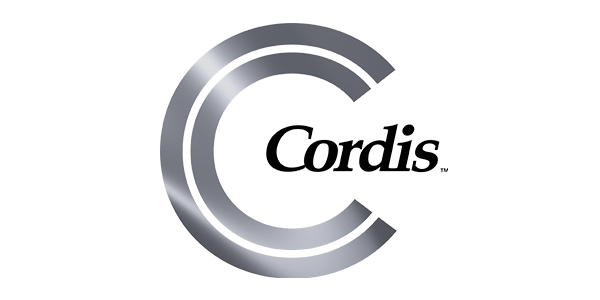

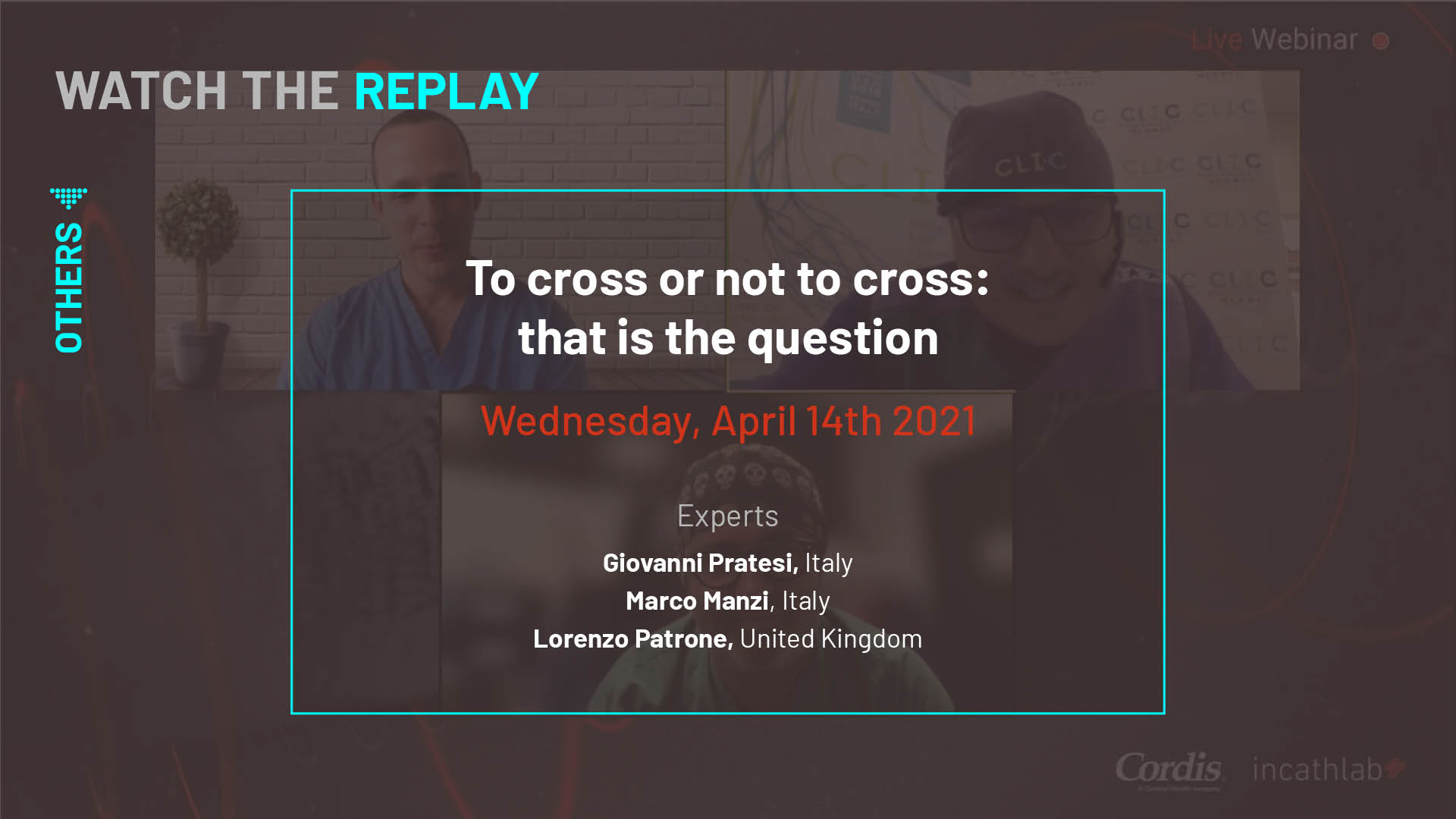
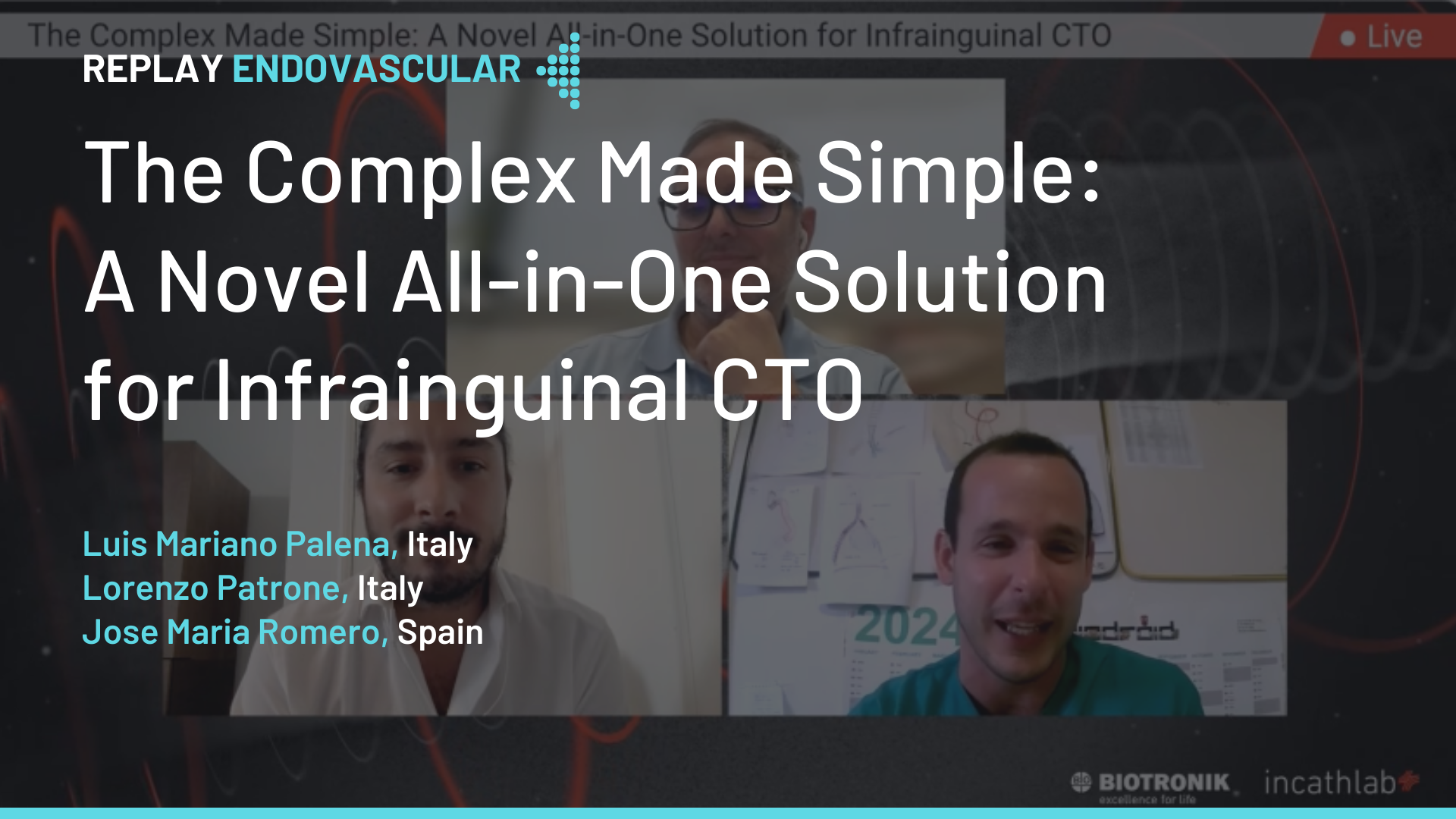
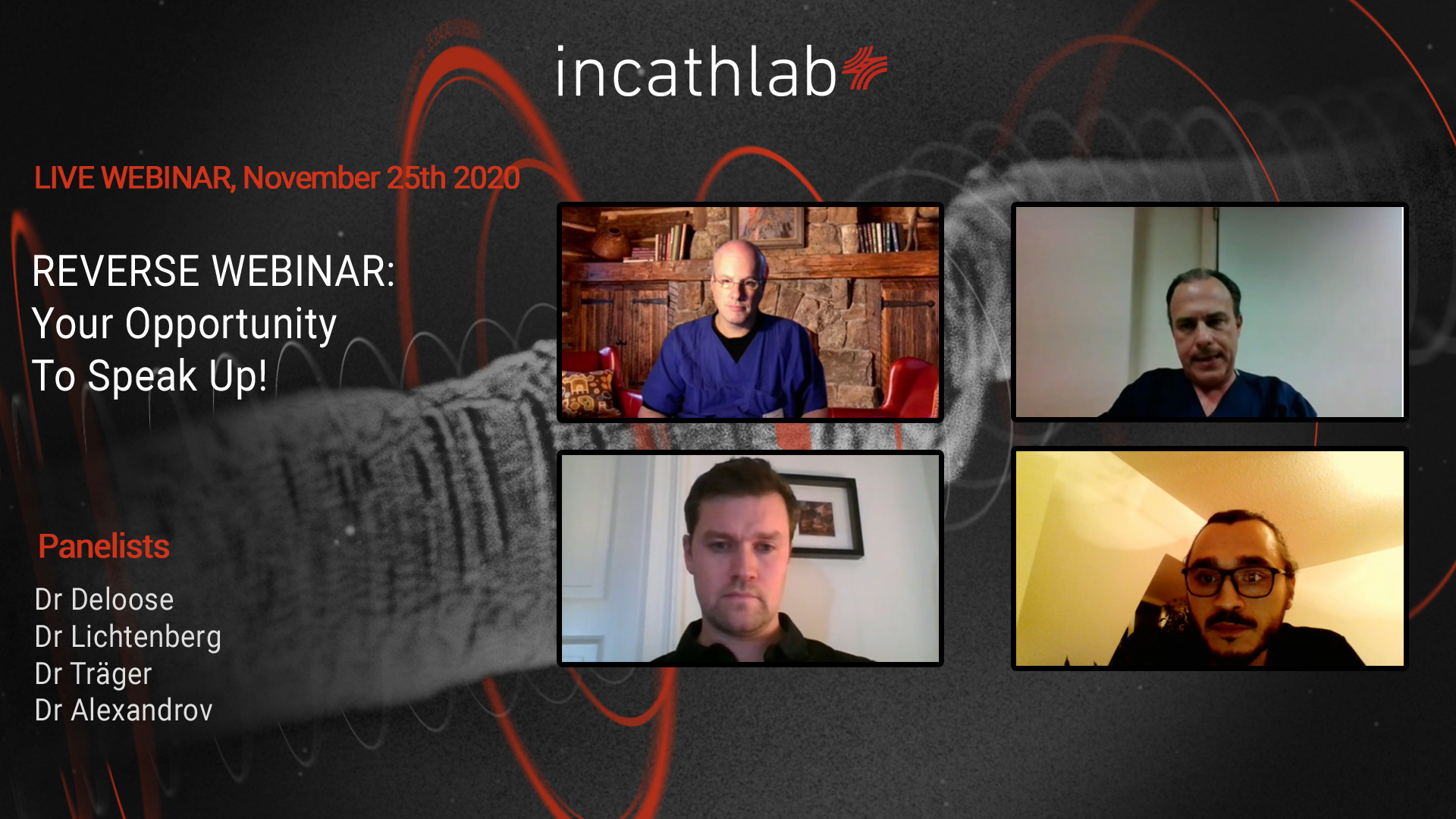
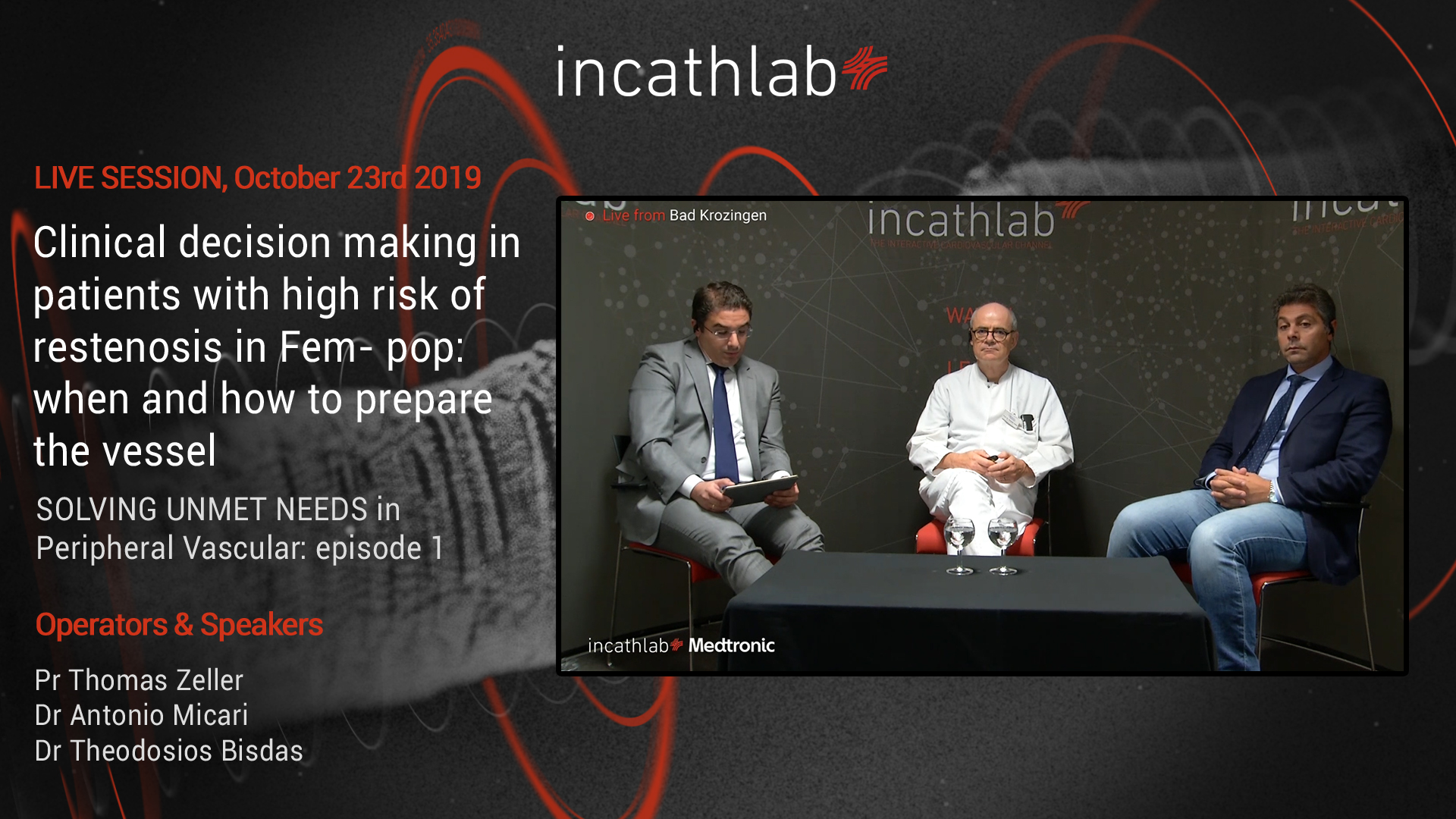

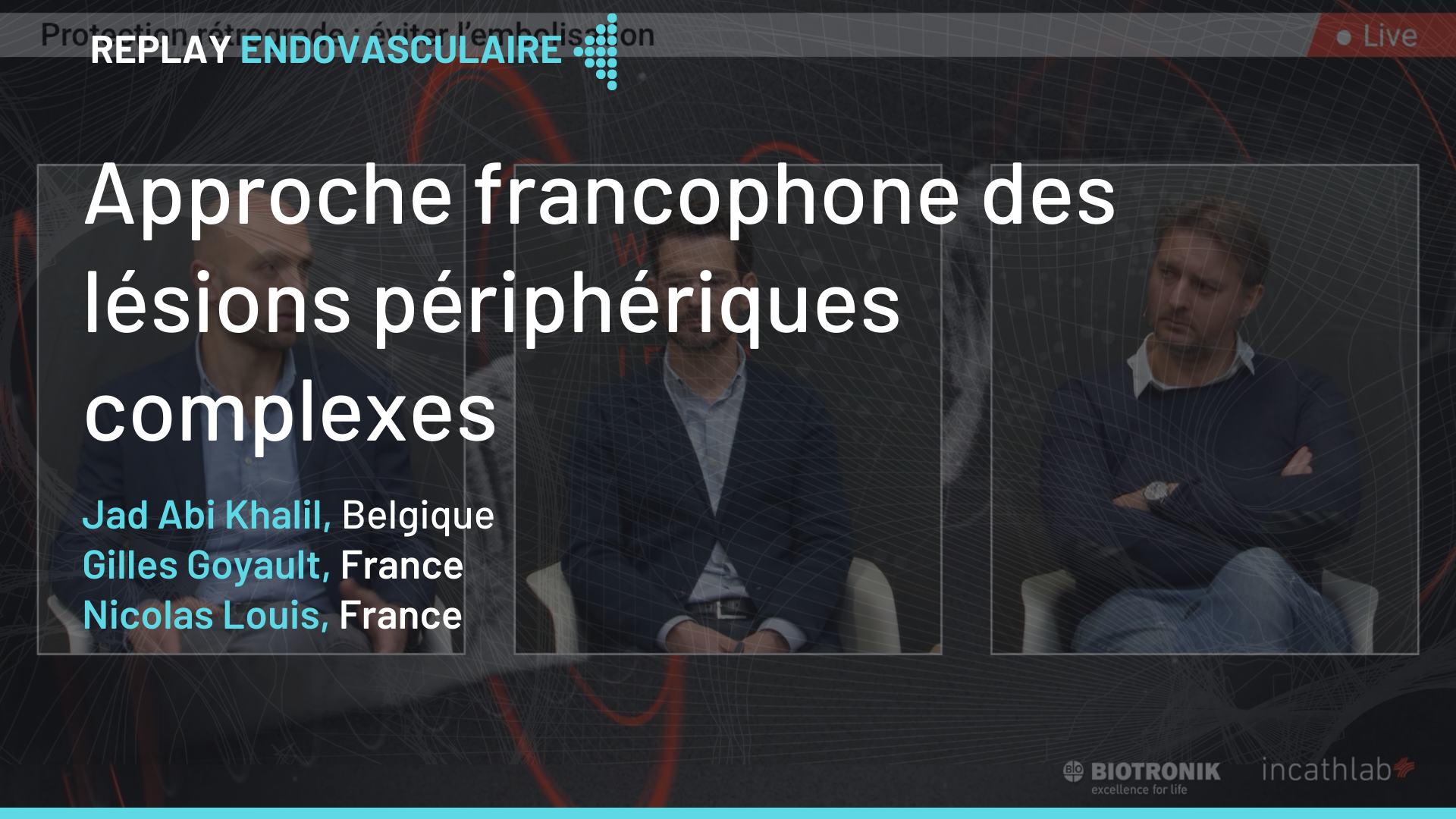

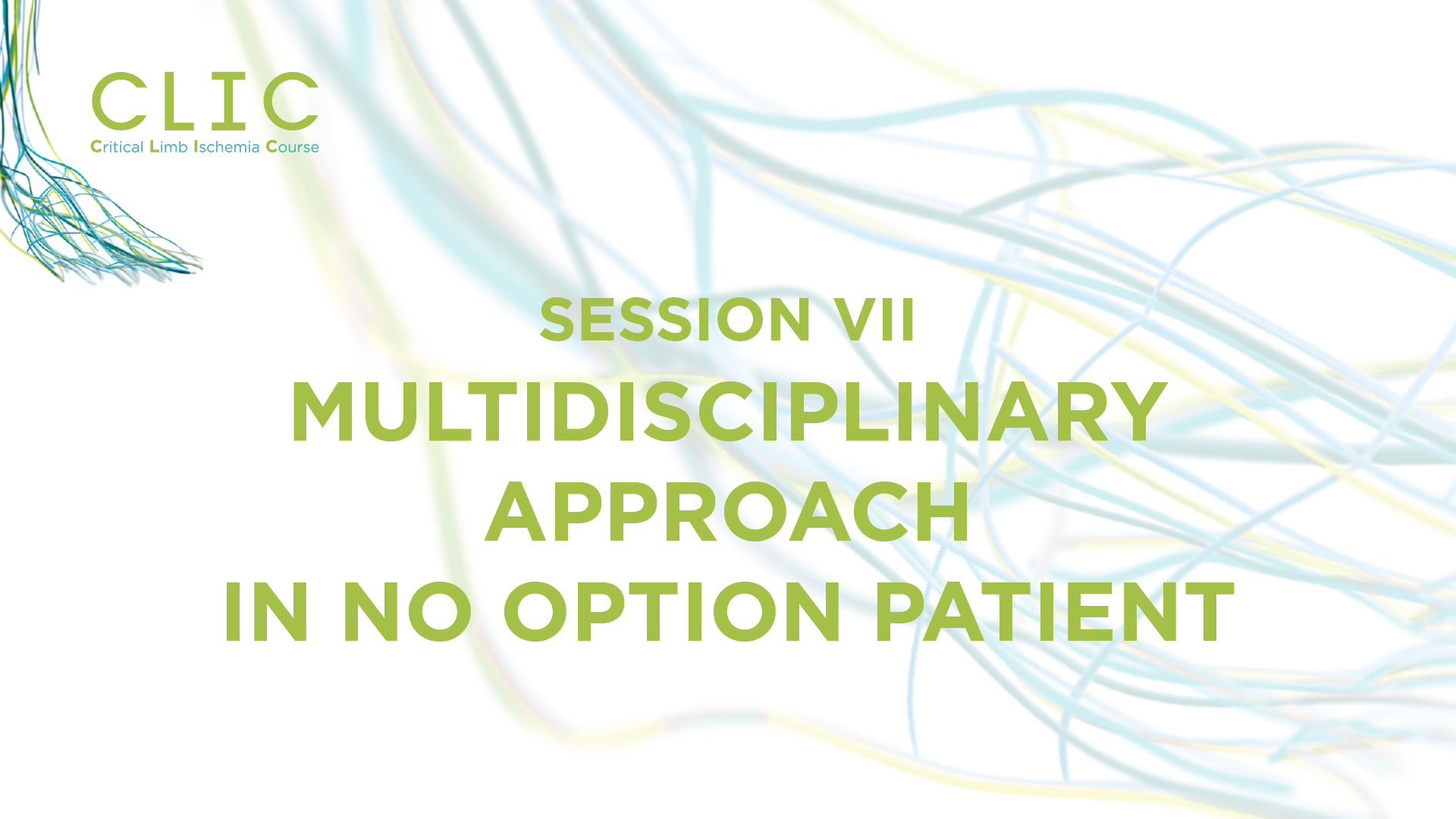
khalid S. Please how to make the wire in a looped shape, do you make it looped before getting to subintimal space or after, shall you enter the subintmal with catether first or with wire first